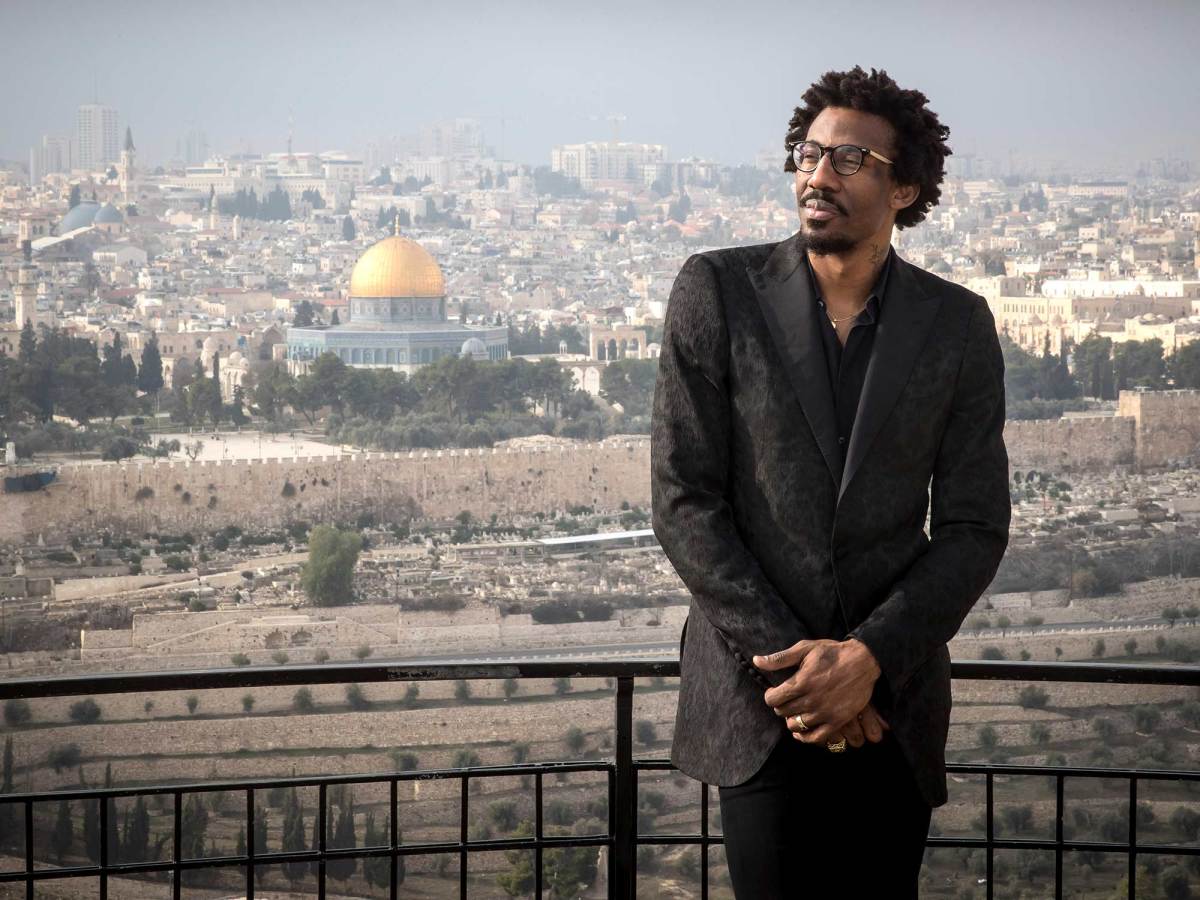Amar'e In Israel: Fresh Start In The Old City

Much as Middle East politics cleave public opinion, maybe everyone can agree on this: For a spit of land roughly the size—and population—of New Jersey, Israel plays a wildly outsized role in the theater of geopolitics. Last month the U.S. abstained from a United Nations resolution condemning Israel for the construction of settlements in disputed territory. This bit of inaction triggered multiple international news cycles, an explanatory speech by Secretary of State John Kerry, a blistering rebuttal from the U.K. and, inevitably, a pointed tweet from the President-elect.
Amid all this meshuggaas, the most famous power forward in all the land remained camped out on the perimeter, as it were. Amar’e Stoudemire lives a few blocks from the prime minister’s residence and a 25-minute walk from Jerusalem’s Old City—where so many raw nerves are exposed—but, as he says in his impossibly deep voice, “the politics aren’t for me.”
Otherwise, though, Stoudemire is thoroughly engrossed in what he calls his “adopted homeland,” maybe the most unlikely celebrity resident in Israel’s 69-year history. To some fanfare and more bemusement, Stoudemire announced last summer that he would be leaving the NBA, his workplace since 2002, to close out his gilded career in Israel, where he’d long felt a spiritual connection. Any cynicism about this being a stunt to draw attention to Hapoel Jerusalem, the team Stoudemire partially owned, was extinguished around the time he and his wife, Alexis, bought a four-story stone house in the Old City, relocated their four kids (and personal chef) from Miami and made a commitment to stay for at least two years. (To avoid the appearance of conflict, he sold his shares back to the team president.)
Apart from playing basketball, Stoudemire, 34, wants to serve as a sort of unofficial ambassador. So it is that, through a mutual friend, he invited my family to share a Friday night dinner at his home last month. “It’s not just Shabbat,” he said upon greeting us, “but it’s the seventh night of Hanukkah.”
While stopping short of considering himself Jewish, Stoudemire self-identifies as a Hebrew Israelite, a tribe that’s believed to have descended from the Kingdom of Judah and inhabited what is now Israel before its expulsion by the Romans in 70 A.D. In keeping with kosher tradition, Stoudemire doesn’t eat pork or shellfish, and he sports a menorah tattoo on his left wrist. Then again, his premeal blessing includes a thank you to Jesus, and body art is considered by some rabbis to be a violation of Jewish law. Bottom line: Stoudemire says that he’s committed to “holy living” and that in Jerusalem, “I’ve never felt more at home, more tied to a place where I’m playing.”

Over a feast of chicken, lamb and fish—after six kids played on the floor with dreidels, the Hanukkah spinning tops—the Stoudemires shared their fish-out-of-water stories common to families living abroad. There was the time the mailman threatened to stop deliveries if they didn’t display their name outside the house in large lettering. (They complied, making Stoudemire the rare star athlete whose residence is easy for fans to find.) The Jerusalem brick girding their home is wonderfully sturdy, but they discovered it interferes with Wi-Fi. (They installed routers on each floor.) They also made national news after 10-year-old Amar’e Jr. was forbidden from playing youth basketball because he is not a citizen. (He plays baseball instead, on a field donated by Patriots owner Robert Kraft.)
But mostly they’re taking full advantage of this cultural exchange, from getting Hebrew lessons to finding the kosher butcher who can slip them turkey bacon on the side. Stoudemire lends his celebrity to worthy causes whenever possible—say, agreeing to fire the starter’s pistol at the Jerusalem marathon in March or lending his name to fund-raising and awareness for Hatzalah, Israel’s version of EMS. But he also quietly walks around the city, taking inventory of its history. On weekends and holidays the family often travels throughout the country and to London, Paris and beyond.
The big adjustments for Stoudemire have come at his workplace, where he often plays in small gyms for less than 1,000 fans. Even as a veteran of international competition, he is still picking up on the rules and nuances of Euro-ball, the niceties of officiating, an Italian coach who speaks mostly with his hands. And Stoudemire’s teammates are . . . “Let’s put it this way,” he says, after searching for diplomatic words, “it’s more of a teaching situation. Like, Here’s where you go on a pick-and-roll.”

The team travels by bus for games in Israel; when going outside the country, it flies commercial. Though he earned more than $167.7 million during his NBA career, Stoudemire has asked for only one special dispensation: his own hotel room on road trips. And apart from suggesting that (in a nod to his trademark on-court accoutrement) Hapoel hold a goggles-give-away night, he doesn’t kibitz in management decisions.
Relying on brute force and savvy moves—not the famously explosive first step that made him a six‑time All‑Star—he’s averaging a modest 9.5 points and 5.8 rebounds on a 7–6 team. So be it. He’s happy to play this new role, gently pointing out to Westerners that so many myths about the country are just that. “People say ‘Is it a war zone?’ and I tell them that couldn’t be further from the truth,” Stoudemire says. “Beautiful country. Beaches. Desert. Great restaurants. Great people.” He stands and opens a side door to make a point. “On the Sabbath it’s so quiet. Everything shuts down for rest, for family time. How nice is that?”
Giannis Antetokounmpo: The Most Intriguing Point Guard In NBA History
As Stoudemire tells stories, you realize that he’s a 6' 10" testament to bold career moves. As a teenager Stoudemire played for six high schools, ultimately graduating from Cypress Creek High in Orlando. He then ignored advice, went directly to the NBA in 2002 and was drafted No. 9 by the Suns. Living in Israel is just another adventure. “This,” says Alexis, “is just kind of how he—and now how we—roll.”
Her husband, politically neutral as ever, is careful not to criticize. But he gently expresses surprise that more NBA players, especially at comparable stages in their careers, don’t embrace similarly exotic exit strategies. For all his talk of a “spiritual quest” and “religious roots,” it becomes clear that the central message of Stoudemire’s pilgrimage to Israel is nondenominational: Leave one comfort zone, and odds are good you’ll find another.
